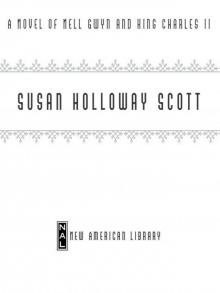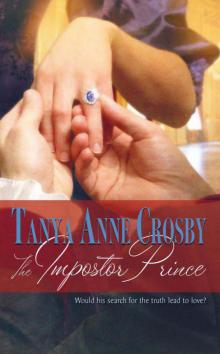- Home
- Tanya Anne Crosby
Redemption Song Page 3
Redemption Song Read online
Page 3
Marta Herrera Nuñez.
Caía had deduced as much from the mailbox, a nicely engraved, permanent plaque. Presumably, Marta was the mystery child’s mother, but that was merely conjecture as Caía didn’t know. Unlike the impermanent layers of tape plastered over her own mailbox down the street, the name on Marta’s box gave a clear indication that the house she lived in didn’t often change hands—which only meant, to Caía, that the woman must have some money . . .
Was she the reason Nick had come to Spain?
What was his connection to that woman and her child?
All three resided here together. And though it was perfectly conceivable that he was renting space, as Caía was doing, she didn’t think so. Why would anyone stir himself to escort some kid to school every day, unless he was invested? No, the task was too much for a mere tenant, even a saintly one, which Nick Kelly most assuredly was not.
You’re not the world’s police, Caía.
Whatever.
Women have to look out for one another, don’t they?
The answer to that question was unequivocally “Yes.”
Caía took another drag of the cigarette and her gut turned.
An image of Nick Kelly trolling around dating sites for unwary victims popped into her head. So, of course, that’s what he’d done. Although . . . why would he abandon his life—a successful one by most standards—and come here to Spain to play nanny to a little girl?
It doesn’t make sense.
Admittedly, none of the answers that came to mind suited Caía’s narrative, save one. Unfortunately, as much as she hated the truth, he wasn’t here to escape justice. Bottom line: To be criminally liable for her son’s accident, the traffic homicide investigation would have had to prove that the driver had been reckless or criminally negligent—excessive speed, texting while driving, that sort of thing. From day one, Nick Kelly had been free to go wherever he pleased. But that didn’t mean he was blameless. For fuck’s sake, he ran over a kid—her kid.
How did someone get to walk away from something like that?
Caía inhaled another drag, and her throat seized. She peered down at the cigarette in her hand, and hurled it to the ground, grinding it into the sidewalk with the toe of her sandal.
She didn’t even know how to smoke. It made her sick. For God’s sake, she was at an all-time low. It was hard work hating someone full time, and it was taking a toll.
First, her mother. Then her son. Then her father. And if that wasn’t enough, Gregg had left her when she’d needed him most, but fine. Whatever. There’s your word again, Gregg. I get it now. It feels good to say it. Freeing. It was like divesting oneself of responsibility. Whatever.
They claimed divorce was difficult, but Caía’s was easy. Her husband was there one day, the next he was gone. But unlike her son’s, Gregg’s absence was a relief.
For months and months after the accident, Caía had sat in her hospital room, staring out her window, hoping to see her son’s face in the glass . . . and, of course, it was an impossibility.
Rather, what she saw, over and over, was her own reflection in the depths of that bathroom mirror, fine red cracks radiating from a center where her forehead had impacted with glass.
She lost herself in that memory for a moment, tasting nicotine in the back of her throat.
At some point, Gregg had discovered her there, standing in the upstairs bathroom—the one closest to Jack’s room—her arms hanging limply at her sides, her blood draining onto the tile, staining the grout. Despair, black and ugly, had been simmering deep in her gut, like liquid hate boiling in a cauldron. She’d stood there, in that bathroom, looking into that mirror—so clean, not a speck of toothpaste anywhere on it—and fury rose up inside her, building to a terrifying climax . . . as it was doing again now.
Later, at the hospital, voices had filtered in from the hall. “Do you think she did it on purpose?”
To her husband’s credit, there had been a bit of sorrow in his answer. “I don’t know,” he’d said. “I don’t know.”
And then a pause, followed by the same female voice. “Mr. Paine, let me rephrase the question. Do you believe your wife presents a danger to herself?”
For a long, long time, Gregg hadn’t responded, and then he’d said, “Yes.” And again, with much more certainty, “Yes.”
And that was that.
Later, once they were alone, Dr. Hale explained, “Some degree of anger is normal, Caía. It’s a natural part of the grieving process. Do you understand what I’m telling you?”
Caía’s throat had felt too thick to speak. Something large was stationed there, swallowing words before they could form.
“Caía, are you listening to me?” There had been a note of impatience in the woman’s voice, enough to keep Caía from answering. “Often, with disordered anger, episodes can be more intense.” And more firmly, she asked, “Caía . . . do you understand what I’m saying?”
How the hell did they expect her to process so much? Losing her mom was difficult enough. But then her whole world had expired in the space of a year. Caía’s mother gave up her fight against cancer the year before Jack’s death. Afterward, her father went downhill fast. The two had been inseparable, and Jack’s death was the final straw. Caía buried her son on June 18, 2016, and her dad on August 5, 2016—whap, whap, whap—rapid-fire heartbreak. And then Gregg dumped her and something snapped.
Whatever.
“Caía?”
Caía had blinked in answer, her throat suffocating her. Her shoulders had tensed until they were made of pain itself.
No one needed to explain to her why she was feeling what she was feeling. “My son is dead,” she’d answered coldly.
Lowering her lashes, the doctor had peered down at the papers in her lap—documents that presumably declared Caía unfit to care for herself. “Yes, I know,” she’d said.
I know.
I know. I know. I know.
Well, did she also know it was Jack’s birthday the day he died? Did she know Caía had bought him a brand-new skateboard, along with another surprise?
Sleek and black with a white marbled moon, the skateboard had been one Jack had been eyeing online for weeks, but not even Caía knew what was inside the accompanying box. Whatever it held was worth more than twice what she’d paid for the skateboard. “Unknown treasures, all handpicked for the avid skateboarder,” the description said.
Still, to this day, she didn’t know what was inside that fucking box. His old skateboard had been crushed beneath the wheels of Nick Kelly’s car, and after her son died, Caía had carried the unopened package to the Dumpster and taken an axe to the brand-new skateboard. And then she’d burned whatever remained in the fire pit in the backyard, wheels and all. She could still recall the smell of rubber, as distinct as the scent of her own blood.
Disordered anger, the doctor had explained, usually presented as a secondary symptom. It was not uncommon with grief, but since Caía had already harmed herself once, she would be better served to remain under expert supervision so they could help her “reconvene on a path to recovery”—reconvene, as though she were meeting someone on an actual path.
Really, what they were trying to say was this: Gregg didn’t want to be responsible for Caía or her grief. Her husband was too busy to mourn their son. He had things to do, places to go, people to see. Girlfriends to screw.
Caía, on the other hand, had nothing better to do than to experience all five stages of grief. Really, there were five stages. But who were these clever people who’d presumed to sum up what was essentially an existential implosion of the soul, going so far as to give each stage discernible names that you could check off, like a to-do list?
In the end, none of those stages, except anger, had been relevant to Caía. She neither had the capacity to deny her son’s death, nor had they allowed her the
liberty to mourn him in peace. Even now, the absence of her duties as Jack’s mother were excruciating.
Every time she didn’t wake up to pack his lunch, or rush home to wash his soccer pants, she remembered. She also remembered every time she didn’t have to clean his bathroom mirror . . .
Caía swallowed a ball of grief.
Across the street, the front door of Nº 5 Calle Lealas opened—a massive door surrounded by ornate baroque stonework. Just inside, beyond the foyer, was a second ironwork door, adding fortification. The only thing she’d ever glimpsed beyond those barriers was the soft glow of more salmon paint and the distant impression of a sunlit back door.
Out came a fiery-haired older woman, producing a set of keys. There was no knob on the outside, only a keyhole. She locked the door, then pushed the face of it before ambling away.
A housekeeper? Maybe a grandmother?
Caía thought perhaps she might be a housekeeper, because she preferred to think of those people as spoiled and privileged and a house that size was bound to employ servants. Although really, it was impossible to say how big the house could be.
Judging by its depth along the alley, not very small.
Out front grew a lovely maple, its ever-increasing circumference buckling the sidewalk around its base—nature’s dogged and subversive threat to civil order.
Without constant care, people and places buckled to their nature. It couldn’t only be Caía who waged a perpetual war with her demons.
Proof of this came marching past as Caía stood waiting for the super mercado to open its doors. It came in the form of a drunken brunette, with thick black eye makeup that no longer complemented her Spanish eyes. Water soluble, the liner had smeared into dark streaks that stained her cheek bones, wearing into well-earned wrinkles. Heels off, brandishing them like weapons, the woman screamed at the top of her lungs, “¡Hijo de puta!” Son of a whore. “¡Asqueroso!” Disgusting man. “¡Boracho!” Drunk. And on and on she went, marching past, continuing her tirade, her voice echoing perversely down empty streets.
Later, she would pull herself together.
Maybe.
Nº 5 Calle Lealas sat on a quiet corner. The super mercado occupied the space across the street, and directly opposite the house, on the southeast corner, sat a lovely church. Iglesia de la Victoria, the plaque read. A single turret overlooked the street—as though watching over the house—an ancient tower, with a blue-and-white tiled dome. Caía wasn’t the least bit religious anymore, but guilt and shame had no denomination.
In her periphery, she spied movement inside the market. Feeling sick to her stomach, she stood another moment, staring at the door across the street, and then peered after the shouting woman, feeling lost. How much further must she fall before she ended up like that?
Maybe you’ve gone too far already?
The woman in the market unlocked the door, shoving it open to allow Caía entry. But Caía didn’t go inside. She didn’t even have a damned coffeemaker. Pretending suddenly felt unhinged. She smiled wanly at the women, and shook her head, then walked away.
Three
If you gaze long enough into an abyss,
the abyss will gaze back into you.
– Friedrich Nietzsche
Chicago, Friday, June 10, 2016
Nick
Like the uppercut jab of a rank fist, the scent of urine plowed up into Nick’s nostrils. Most days, it was the wafting odor of fair-trade coffee he focused on. Today, gray skies, surly faces, and an ass-chapping wind did nothing to ease the scent of fermenting urine in Chicago’s former meat-packing district. This was the city’s final urban frontier, home to trending art galleries, tasting rooms, and up-and-coming wealth management agencies. Hey, if it was good enough for Google, it should be good enough for Starr Wealth Management. On his way into the building, outside the Starr parking garage, a woman stepped into Nick’s path. “L fare?” she begged.
With dirty blond hair and bruised skin, she might have been pretty except for the scabs all over her face. She held a palm out. That was the thing about industrial grit, it came with a bit more reality than some folks were prepared to accept.
Automatically, Nick reached into his pocket. But he stopped short as he focused on the tremor of her hand. The scabs were indicative of a meth user. Her sleeves were rolled down in eighty-degree weather. She shivered as she stared up at him. Roughly twenty. He wasn’t doing her any favors by paying for another fix. “Sorry,” he said, fingering the silver in his pocket. “I got nothing.” And still some part of him itched to lift out the coins and sprinkle them into her hand.
For an awkward moment, he waffled, and her eyes snapped to his brand-new suit, then to his briefcase, returning to his face, the look in her eyes scathing. “Fuck off,” she said hatefully, her face twisting with what could only be described as a deep-seated loathing. Nick shook his head, brushing past her. “Think you’re better’n me?” she screamed. “Fuck yourself, mother-fuckin’ coal cracker!” Nick was Irish, but he’d never seen the inside of a coal mine. In fact, neither had his father or his grandfather. But some hatreds ran deep, like that piss scent that couldn’t be eradicated with a little bit of North Side toilet water.
His shoulders tensed as he walked away, his grip tightening on his briefcase. You can’t save the world, he told himself, but his thoughts returned to the phone conversation with Marta. Without distraction for the remainder of the way into the office, he thought about his brother’s wife.
Inside the Starr building, all throughout the lobby, on the way up the elevator, he refrained from making eye contact, and he made it into his office without having to speak another sound.
Although she was normally in her chair long before Nick arrived, Amy wasn’t in yet. He meant to speak to her this morning, figure out how to best handle their work relationship. Prying his white-knuckled grip from the handle, he sat the briefcase down on the chair facing his desk, unwilling to tackle the contents until he downed a shot of caffeine. He stretched his fingers and studied the indentations in his hand, shaking his head over the persistent tension. Coffee wasn’t the answer, but he couldn’t start his morning without it.
He’d never once asked Amy to fetch him a cup, but she usually rushed out after greeting him. Today, the office was quiet, none of the cubicles occupied yet, so he made a beeline into the kitchen. Once there, he fumbled with the coffeemaker, trying to figure out where to stick the cup. The damned things were like bathroom faucets; every one worked a little differently. Pushing and shoving and pressing, he nevertheless figured it out, and then he waited less than patiently for his cup to fill, all the while listening for sounds of life beyond the kitchen door. More than usual, he wasn’t in the mood for idle chatter.
His luck held out. But the instant he walked into his office, the overhead lights flickered on. With the steaming cup in hand, Nick sank into his chair. And, for a long, disordered moment, he sat, staring at his briefcase, sipping from his coffee.
Clack. Clack. Clack.
Not heels. Hard leather. Long purposeful strides. The footfalls grew louder and louder, going on and on for the length of the office—half the size of a football field—all the way back to Nick’s office. He’d left the door open for Amy, but it was Sam Starr who knocked on the doorframe. “Morning,” he said.
Nick gave his boss—and friend—a half-hearted smile. “Did you come all this way to give me a morning kiss, or something else on your mind?”
Sam shuffled in, moving Nick’s briefcase from the chair and setting it aside to replace it with his Prada-covered ass. He flicked a perfectly manicured fingernail over his graying sideburns—proof that, if you had any conscience, this business waged war with your physical being. “Quick on the draw, straight to the point, that’s what I like best about you, Nick.”
Nick took a sip of his coffee. “Yeah?”
The senior partner of his firm
sank into the chair facing him, crossing his legs. “It’s Amy,” Sam said.
Nick nodded, half expecting it to be the case. “Did she come talk to you this morning?”
“No, yesterday, but not for any reason you might think. She told me everything, Nick.”
The tension in Nick’s shoulders returned. “Told you what?”
“About Jimmy.”
“Oh,” he said, and his head fell back against the headrest of his chair. Beneath his breath, he said, “Damn it.”
“You can’t fire her for telling us. Fact is, you shouldn’t be sharing pillow-talk with her at all.” Sam was one to talk. On the other hand, Nick had never allowed himself to get involved with an employee before now, despite the office being about as incestuous as they came. Shared happy hours made it too easy to slip into a coworker’s bed. Except it wasn’t like that for Nick. He normally kept his pants tightly zipped. Amy had been a willing shoulder in a weak moment.
Still, it was no excuse. Nick was her boss. He sat his coffee cup down on the desk, leaning forward, lifting a hand to his temple. “So, you’ll give her a new assignment?”
Sam allowed him a moment to play out all the possible consequences—his card-carrying right as the “Starr” partner of the firm. Except that Nick outdid him nine months out of twelve. That, more than the fact that he and Sam had once shared a college dorm, was Nick’s assurance that his “consequences” would amount to something less than a slap on the wrist. He was far more concerned about Amy than he was about himself. “She needs the job,” Nick said.
“Don’t worry about it; we’ll work it out.”
“Good.”
Out in the general assembly room, the morning influx of employees had already begun. Sounds of light switches clicking on, telephone receivers being lifted, and buttons being punched increased, but in Nick’s office, the silence was absolute. After a long, uncomfortable moment, Sam said, “Is there anything we can do?”
“No.”
“If you need time off, you’ll let me know?”

 Lord of Shadows (Daughters of Avalon Book 5)
Lord of Shadows (Daughters of Avalon Book 5) To Love a Lord: A Victorian Romance Collection
To Love a Lord: A Victorian Romance Collection The Daughters of Avalon Collection: Books 1 & 2
The Daughters of Avalon Collection: Books 1 & 2 The Impostors: Complete Collection
The Impostors: Complete Collection The Holly & the Ivy (Daughters of Avalon Book 2)
The Holly & the Ivy (Daughters of Avalon Book 2) A Winter’s Rose
A Winter’s Rose Fire Song (Daughters of Avalon Book 4)
Fire Song (Daughters of Avalon Book 4) Elizabet
Elizabet Kissed; Christian
Kissed; Christian Once Upon a Knight
Once Upon a Knight Viking: Legends of the North: A Limited Edition Boxed Set
Viking: Legends of the North: A Limited Edition Boxed Set Five Unforgettable Knights (5 Medieval Romance Novels)
Five Unforgettable Knights (5 Medieval Romance Novels) Meghan: A Sweet Scottish Medieval Romance
Meghan: A Sweet Scottish Medieval Romance Reprisal: A Prequel Short Story to REDEMPTION SONG
Reprisal: A Prequel Short Story to REDEMPTION SONG Highland Song
Highland Song The Summer Star: One Legend, Three Enchanting Novellas (Legends of Scotland Book 2)
The Summer Star: One Legend, Three Enchanting Novellas (Legends of Scotland Book 2) Once Upon a Kiss
Once Upon a Kiss MacKinnons' Hope: A Highland Christmas Carol
MacKinnons' Hope: A Highland Christmas Carol The MacKinnon's Bride
The MacKinnon's Bride Highland Brides 04 - Lion Heart
Highland Brides 04 - Lion Heart A Perfectly Scandalous Proposal (Redeemable Rogues Book 6)
A Perfectly Scandalous Proposal (Redeemable Rogues Book 6) Reprisal
Reprisal Maiden from the Mist (Guardians of the Stone Book 4)
Maiden from the Mist (Guardians of the Stone Book 4) Tell No Lies
Tell No Lies The King's Favorite
The King's Favorite Meghan: A Sweet Scottish Medieval Romance (Sweet Scottish Brides Book 2)
Meghan: A Sweet Scottish Medieval Romance (Sweet Scottish Brides Book 2) The Impostor Prince
The Impostor Prince Happily Ever After
Happily Ever After Sophie's Heart: Sweet Historical Romances
Sophie's Heart: Sweet Historical Romances Viking's Prize
Viking's Prize Page
Page Angel of Fire
Angel of Fire Once Upon A Highland Legend
Once Upon A Highland Legend Highland Brides 03 - On Bended Knee
Highland Brides 03 - On Bended Knee Sagebrush Bride
Sagebrush Bride Lyon's Gift
Lyon's Gift Lady's Man
Lady's Man The King's Favorite (Daughters of Avalon Book 1)
The King's Favorite (Daughters of Avalon Book 1) Highland Storm
Highland Storm Redemption Song
Redemption Song Three Redeemable Rogues
Three Redeemable Rogues